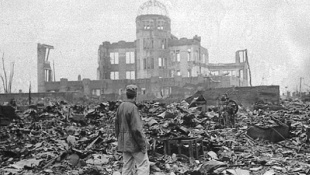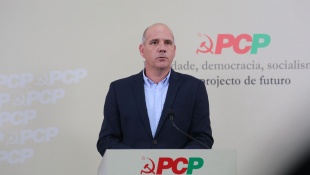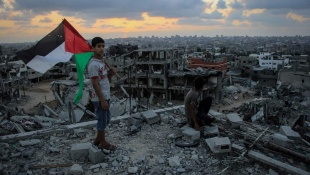August 6, 1945 is a date that progressive and peace-loving forces around the world signal, so that the memory of the monstrous crime, which was the launching of the first atomic bomb on the Japanese city of Hiroshima ( and three days later on Nagasaki), is not forgotten and learn from that tragedy, which caused thousands of deaths and suffering that lasts until today, lessons for the fight against militarism and war and for nuclear disarmament.
It is a duty of memory and a moment of reaffirmation, year after year, of the firm commitment of the Portuguese communists in the struggle for a world of peace and friendship among peoples, freed from the threat of nuclear weapons, where the huge resources wasted on arms are channelled for the promotion of social progress and for the fight against hunger, disease, underdevelopment and other serious problems that affect the vast majority of Humanity.
At a time when imperialism is fostering tension in international relations, with expression in the escalation of war and confrontation in Europe and in other regions such as Asia-Pacific, with the serious dangers that such an escalation entails for the world, and which include the decisions adopted at the recent NATO summit in Vilnius aimed at intensifying the arms race and expanding into the Asia-Pacific region, the more necessary it becomes to remember what the criminal launching by the US of the atomic bomb on the Japanese cities of Hiroshima and Nagasaki meant.
Falsely presented as essential to defeat Japan and put an end to World War II in the Pacific, given that in reality Japanese militarism was already defeated, the use of the atomic weapon by the US, the only country that then possessed and used it, constituted an affirmation of the strength of US imperialism and its limitless ambition for world hegemony, particularly targeting the USSR and the impetus of the liberation struggle that was then emerging around the world.
It was in reality an extreme expression of the aggressive nature of imperialism which, limited by the struggle of the workers and peoples and by the existence of the USSR and the socialist camp, became even more violent with the disappearance of the powerful counterweight that these countries and their policy in defence of peace and disarmament represented. The continuous increase in military expenditure, the production of increasingly sophisticated weapons, the constant reinforcement and enlargement of NATO, the abandonment of important disarmament agreements, namely with regard to nuclear weapons, the systematic disregard for the principles of the UN Charter and international law, the multiplication of acts of interference and aggression against peoples and countries by imperialism, entails very serious dangers for the very fate of Humanity.
By evoking Hiroshima and Nagasaki, the PCP calls on the Portuguese people, and particularly the youth, to intensify the struggle for peace and disarmament, first of all so that the US, NATO and the EU put an end to their strategy of confrontation and cease to instigate the war in Ukraine, as well as to Russia and all the other players, so that the path of negotiation is urgently embarked on in order to reach a political solution to the conflict, to respond to the problems of collective security and disarmament in Europe, to comply with the principles of the UN Charter and the Final Act of the Helsinki Conference.
The PCP alerts that the foreign and defence policy of successive PS, PSD and CDS governments, which Chega and IL fully share, has compromised national sovereignty and independence and is dangerously involving Portugal in the aggressive militaristic strategy of imperialism. The PCP stresses that the Constitution of the Portuguese Republic obliges the Portuguese State to pursue a policy of peace and international cooperation, involving namely the dissolution of political-military blocs, as well as a general, simultaneous, and controlled disarmament, naturally including the abolition of nuclear weapons and other weapons of mass destruction. In this sense, it is particularly significant that the Portuguese Government continues to refuse to subscribe to the Treaty on the Prohibition of Nuclear Weapons.
The PCP considers that the fight against imperialism's militarist policy, for peace and disarmament, is inseparable from the fight against exploitation and for the social and political rights of workers and peoples.
Remembering Hiroshima and Nagasaki means fighting so that such a tragedy never happens again. It is to intensify the fight against fascism and against war, against the aggressive policy of imperialism, for the dissolution of NATO, for the political solution of conflicts with respect for the sovereignty of peoples, for disarmament and, in the first place, for nuclear disarmament. It is to unite all the forces that can be united in the struggle for peace and to permanently remove from the horizon the danger of a nuclear holocaust.
The PCP will do everything in its power to promote the convergence and unity of those who, regardless of differences of opinion, have in common the aspiration for a world of freedom, peace, and social justice.
Faced with the complex and dangerous international situation that we are experiencing today, it is necessary and urgent to give more strength to the struggle for peace and disarmament.



